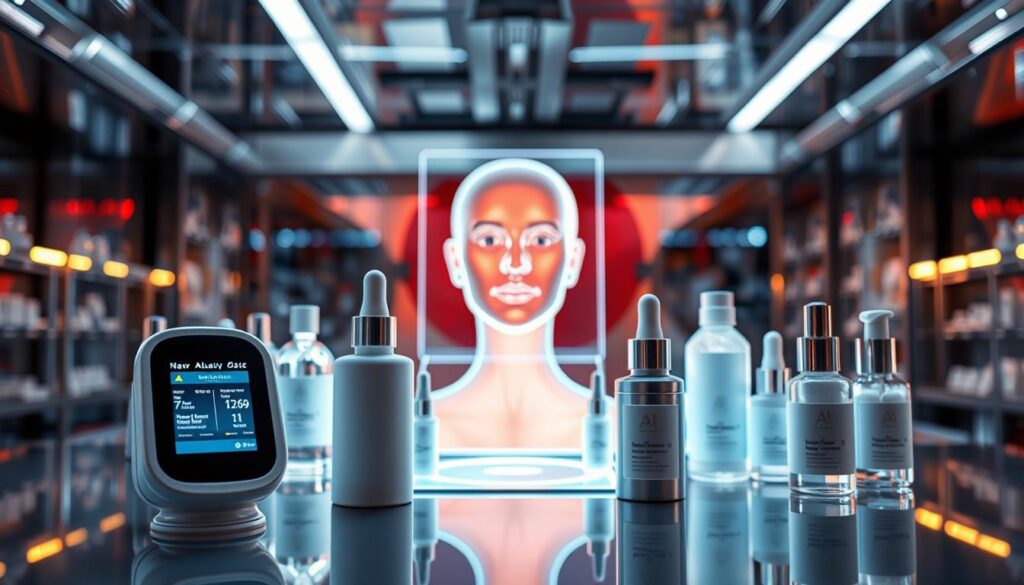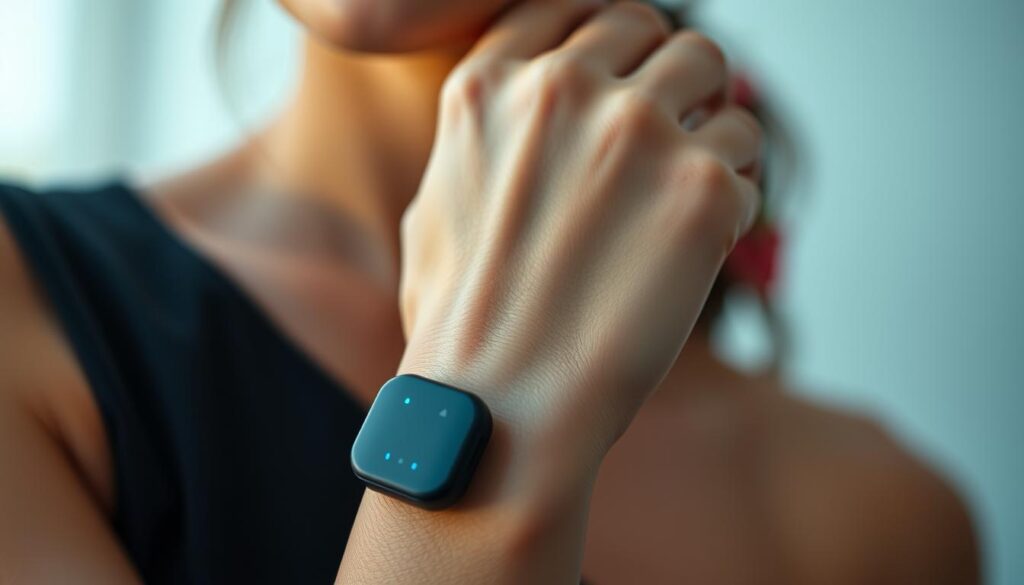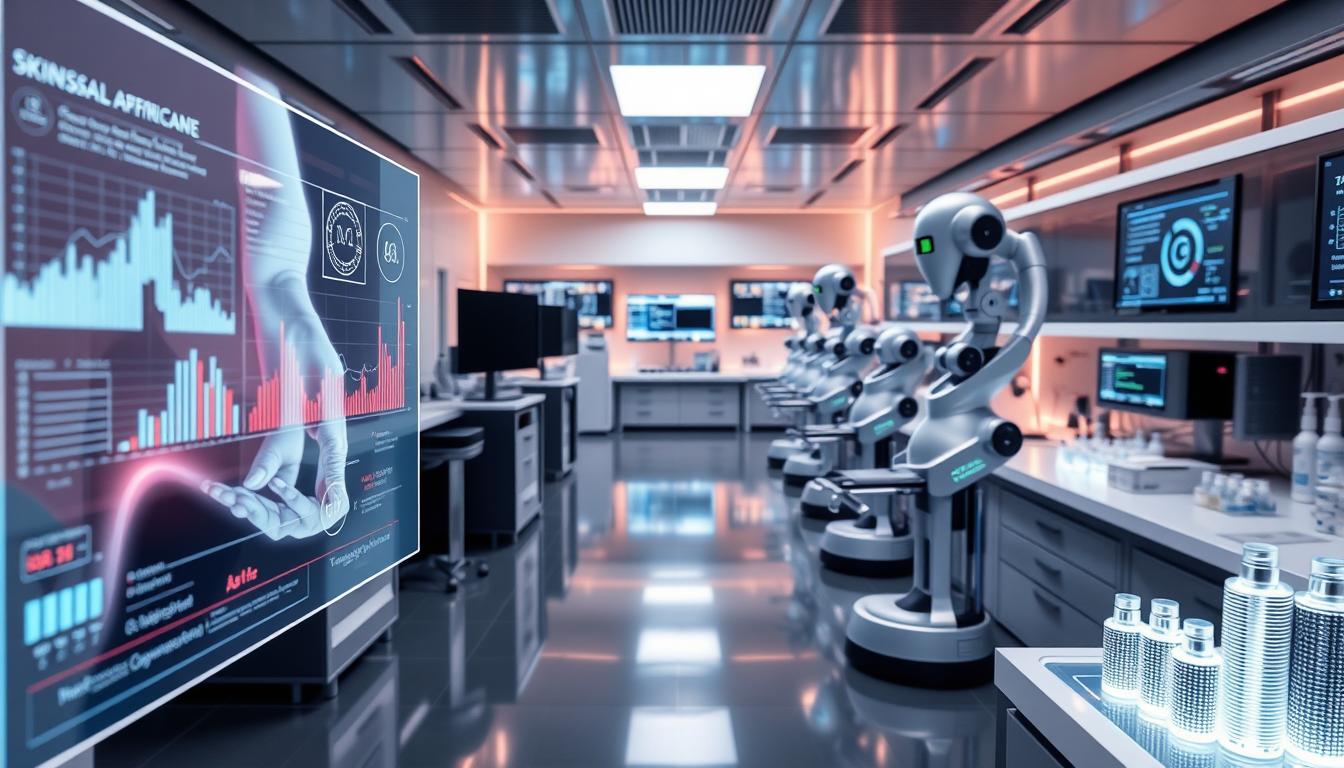Did you know that by 2025, the demand for personalized skincare solutions is expected to skyrocket, shifting away from traditional one-size-fits-all approaches1? This trend is driven by advancements in artificial intelligence and machine learning, which are transforming the beauty industry. AI-powered tools can now analyze your unique skin type, environmental factors, and even hydration levels to recommend the perfect products for your needs1.
Brands like Neutrogena and L’Oréal are leading the charge with innovations such as smart mirrors and virtual try-on apps. These tools use real-time data to provide tailored skincare routines and product suggestions. For example, Lululab’s AI technology boasts a 90% accuracy rate in assessing skin conditions like acne and pigmentation2.
The future of skincare lies in personalization. AI not only helps identify your skin concerns but also adjusts your routine based on environmental changes. This ensures optimal care while reducing waste from unsuitable products1. As the industry evolves, AI is set to become an essential tool for achieving healthier, more radiant skin.
Key Takeaways
- AI analyzes skin type, hydration, and environmental factors for tailored solutions.
- Smart mirrors and apps provide real-time feedback and product recommendations.
- Brands like Neutrogena and L’Oréal are pioneering AI-driven skincare tools.
- Personalization reduces waste by minimizing unsuitable product purchases.
- AI adjusts skincare routines based on environmental changes for optimal care.
Introduction to the Future of Personalized Skincare
The beauty industry is undergoing a massive transformation, driven by consumer demand for tailored solutions. Over 70% of beauty consumers express interest in AI-powered personalization, signaling a shift away from generic products3. This trend is fueled by advancements in artificial intelligence, which are redefining how skincare routines are designed and implemented.
Overview of AI’s Impact on the Beauty Industry
AI is revolutionizing the beauty sector by offering precise solutions for individual needs. Brands like Olay and Sephora are leveraging this technology to enhance customer experiences. For instance, Olay’s Skin Advisor platform boasts a 90% accuracy rate in predicting skin age, leading to a 200% increase in conversion rates3. Such innovations highlight the growing role of AI in the industry.
The Shift from Generic to Customized Routines
Traditional one-size-fits-all approaches are being replaced by highly tailored skincare routines. AI analyzes factors like skin type, hydration levels, and environmental conditions to provide personalized recommendations. Proven Skincare’s AI engine, for example, evaluates over 20,000 ingredients and 100,000 products to deliver customized solutions3. This shift not only improves results but also reduces waste from unsuitable products.
Tools like virtual try-ons and smart mirrors are at the forefront of this change. These devices offer real-time feedback, helping consumers make informed decisions. As the market for AI in cosmetics grows, it’s clear that the future of skincare lies in personalization and innovation4.
Understanding the Science Behind AI-Powered Skin Analysis
The science behind AI-powered skin analysis is reshaping how we approach skincare. By combining machine learning and computer vision, this technology provides detailed insights into skin health. These tools analyze factors like texture, tone, and pore size to deliver precise recommendations5.
Machine Learning and Computer Vision in Skincare
Machine learning algorithms process vast amounts of data to identify patterns in skin health. They evaluate millions of data points, including texture, elasticity, and early signs of aging6. Computer vision enhances this by capturing high-resolution images for detailed analysis. Together, they detect subtle conditions that may be invisible to the naked eye.
For example, AI systems can assess moisture levels, pigmentation, and fine lines with remarkable accuracy. This granular detail allows for highly tailored skincare solutions5.
Integrating Genetic and Environmental Data
AI also integrates genetic and environmental data to improve product efficacy. Genetic analysis predicts how skin responds to specific ingredients, helping to avoid sensitivities5. Environmental factors like humidity, UV exposure, and pollution levels are also considered. This ensures formulations are optimized for individual living conditions.
Real-time data from biomarkers, such as skin barrier function and hydration levels, further refine these recommendations. This dynamic approach adapts to seasonal changes and hormonal fluctuations6.
| Technology | Function | Benefit |
|---|---|---|
| Machine Learning | Analyzes skin patterns | Precise recommendations |
| Computer Vision | Captures detailed images | Detects subtle conditions |
| Genetic Analysis | Predicts ingredient response | Reduces sensitivities |
| Environmental Data | Optimizes formulations | Adapts to living conditions |
These advancements are leading to improved skincare formulations and recommendations. Brands leveraging this technology are setting new standards in the beauty industry7.
Your Skin, Your Algorithm: How AI is Revolutionizing Personalized Skincare
Real-time data is transforming the way skincare routines are tailored to individual needs. By leveraging advanced technology, brands can now provide immediate and accurate recommendations based on your unique skin type and conditions8.
Tailored Recommendations Through Real-Time Data
Dynamic algorithms play a crucial role in adjusting skincare routines to meet changing needs. These algorithms analyze factors like hydration levels, environmental exposure, and specific skin concerns to deliver personalized solutions9.
For example, Parallel’s MD-03 Phage Protocol™ uses real-time data to create custom serums targeting issues like acne and aging. This approach ensures that each product is optimized for your skin’s unique requirements8.
Brands like Haut.AI are also leading the way with platforms that analyze millions of data points to improve skin metrics. Their algorithms are updated every six months to incorporate the latest research, ensuring accurate and up-to-date recommendations10.
Benefits of Continuous Data Monitoring
Continuous monitoring allows for real-time adjustments to your skincare routine. This ensures that your skin care evolves with your needs, providing consistent improvements over time9.
Smart devices and apps offer immediate feedback, helping you make informed decisions about ingredients and products. This reduces the risk of using unsuitable items and enhances overall skin health8.
| Feature | Benefit |
|---|---|
| Real-Time Data | Immediate and accurate recommendations |
| Dynamic Algorithms | Adjust routines based on changing conditions |
| Continuous Monitoring | Ensures consistent improvements |
| Smart Devices | Provides instant feedback for better decisions |
These advancements highlight the future of skincare, where personalization and technology work hand in hand to deliver optimal results. By embracing these tools, you can achieve healthier, more radiant skin10.
Innovative AI-Driven Beauty Tools Transforming Your Routine
The beauty industry is embracing cutting-edge AI tools to redefine skincare routines. These advancements are making it easier than ever to achieve tailored solutions for individual needs. From smart mirrors to virtual try-ons, these tools are reshaping the way consumers interact with beauty products11.

Smart Mirrors and Augmented Reality Solutions
Smart mirrors are revolutionizing the way you analyze and care for your skin. Equipped with augmented reality, these devices provide real-time updates on skin conditions and suggest suitable products12. Brands like Perfect Corp are leading the charge, offering interactive experiences that mimic professional consultations.
These mirrors use advanced technology to detect issues like acne, wrinkles, and pigmentation. By integrating environmental data, they offer personalized recommendations that adapt to your lifestyle11.
Virtual Try-Ons and AI Skin Analysis Apps
Virtual try-on technologies allow you to visualize makeup and skincare products without physical application. Apps like Skincredible use AI to analyze selfies, providing detailed insights into your skin’s condition12.
These tools evaluate factors like moisture levels, texture, and fine lines. They then recommend products tailored to your specific concerns, ensuring a more effective routine11.
By combining convenience with precision, these apps are enhancing customer engagement and driving innovation in the beauty industry12.
Harnessing Data for Precision Skincare and Predictive Analytics
Data-driven insights are transforming the beauty industry, offering precision skincare solutions tailored to individual needs. By leveraging advanced technology, brands can now analyze vast amounts of consumer data to predict trends and improve product efficacy13.
Predictive analytics plays a crucial role in foreseeing potential skin issues before they become prominent. These tools analyze factors like hydration levels, environmental exposure, and specific skin concerns to deliver personalized solutions14.
Real-Time Feedback and Adaptive Routines
Real-time feedback loops are essential for optimizing skincare routines. Continuous monitoring devices provide immediate updates on skin health, leading to a 25% improvement in adherence to routines14.
Dynamic algorithms adjust recommendations based on changing conditions. For example, AI-driven tools can simulate skin analysis, reducing the need for physical testing and accelerating time-to-market for new products13.
Consumer Data Trends and Insights for Better Results
Analyzing consumer data helps brands develop more effective skincare solutions. Machine learning algorithms evaluate millions of data points, including texture, elasticity, and early signs of aging14.
Historical data analysis informs future product development. By integrating genetic and environmental data, brands can optimize formulations for individual living conditions13.
- Data-driven insights lead to precision skincare and effective routine adjustments.
- Predictive analytics forecasts skin issues with 85% accuracy, enabling preventive measures14.
- Real-time feedback ensures adaptive routines that evolve with individual needs.
- Consumer data analysis drives innovation in product development and recommendations.
These advancements highlight the future of skincare, where personalization and technology work hand in hand to deliver optimal results. By embracing these tools, you can achieve healthier, more radiant skin15.
Integrating Wearable Technology for a Holistic Skincare Approach
Wearable technology is reshaping skincare by offering real-time insights into hydration and UV exposure. These devices provide actionable data, enabling a more precise and personalized approach to skincare16.

Monitoring Hydration and UV Exposure
Wearable devices like smartwatches and UV sensors track hydration levels and UV exposure in real time. This data is integrated with AI to enhance the accuracy of skincare recommendations17.
For example, brands like L’Oréal have developed UV sensors that measure sun exposure and suggest protective measures. These tools ensure that skincare routines adapt to environmental changes16.
Continuous monitoring from wearables provides personalized insights. This helps consumers make informed decisions about products and routines, reducing the risk of unsuitable choices17.
By blending traditional skincare with innovative tech, a holistic approach is achieved. This ensures optimal care while minimizing waste from ineffective products16.
Ethical, Sustainable, and Personalized Beauty in the AI Era
The integration of AI in beauty is not just about innovation but also about addressing ethical and sustainability concerns. As brands leverage technology to deliver personalized solutions, they must also navigate challenges like data privacy and environmental impact18.
Balancing Innovation with Data Privacy
AI-driven personalization relies heavily on consumer data, raising questions about privacy and security. Brands must ensure transparency in how data is collected, stored, and used to build trust with their audience18.
For example, ethical governance of AI ensures fairness and responsible data use. This includes safeguarding sensitive information like skin type and lifestyle preferences19.
Eco-Friendly Product Recommendations and Waste Reduction
AI is also playing a pivotal role in promoting sustainability. By analyzing ingredient sourcing and environmental impact, brands can recommend eco-friendly products tailored to individual needs20.
AI reduces waste by minimizing trial-and-error in product selection. This ensures consumers only purchase items that align with their skin concerns and values18.
| Strategy | Benefit |
|---|---|
| Ingredient Analysis | Recommends eco-friendly products |
| Data-Driven Selection | Reduces unsuitable purchases |
| Ethical Data Use | Builds consumer trust |
| Sustainability Focus | Minimizes environmental impact |
By embracing ethical practices and sustainability, brands can create a future where beauty and responsibility go hand in hand. This approach not only benefits the consumer but also the planet19.
Conclusion
AI-driven solutions are reshaping the beauty industry, offering precise and tailored skincare experiences. From analyzing millions of data points to delivering real-time feedback, this technology ensures optimal care for every skin type21.
Innovative tools like smart mirrors and virtual try-ons empower consumers to make informed decisions. These advancements reduce waste by recommending only suitable products, enhancing both effectiveness and sustainability22.
As the industry evolves, AI continues to set new standards in skincare. Embracing these solutions not only improves skin health but also paves the way for a more personalized and eco-friendly future23.
The future of beauty lies in harnessing technology to meet individual needs. By adopting AI-driven tools, consumers can achieve healthier, radiant skin while contributing to a sustainable industry21.
FAQ
What is AI-powered skincare?
How does AI analyze skin conditions?
What are the benefits of personalized skincare routines?
Can AI tools predict future skin concerns?
Are AI skincare apps accurate?
How do wearable devices enhance skincare?
Is AI skincare sustainable?
What role does data privacy play in AI skincare?
Can AI replace dermatologists?
Source Links
- How AI Is Revolutionizing Personalized Skincare Routines in 2025 – https://www.halecosmeceuticals.com/blog/how-ai-is-revolutionizing-personalized-skincare-routines-in-2025
- The Future of Skincare: How Artificial Intelligence Is Changing the Game – Zeam Health & Wellness – https://www.zeamhealth.com/the-future-of-skincare-how-artificial-intelligence-is-changing-the-game/
- Personalized Beauty Routines: How AI is Revolutionizing the Skincare Industry – https://www.atomixlogistics.com/blog/ai-personalized-beauty-skincare
- Future Of Skincare: How AI Skincare Is Transforming Formulation – https://learncanyon.com/future-of-ai-skincare/
- How AI is Revolutionizing Personalized Skincare Formulations in 2024 – https://dev.to/josef_doctorovitz_ww/how-ai-is-revolutionizing-personalized-skincare-formulations-in-2024-178
- How Artificial Intelligence is Revolutionizing the Skincare Industry with Personalized, Data-Driven Insights – https://www.linkedin.com/pulse/how-artificial-intelligence-revolutionizing-skincare-dr-nilesh-wsodf
- Long read: How AI-powered beauty delivers hyper-personalized products & sustainable solutions in real time – https://www.cosmeticsdesign.com/Article/2024/09/11/long-read-how-ai-powered-beauty-delivers-hyper-personalized-products-sustainable-solutions-in-real-time/
- How AI is Transforming Skin Health – https://www.parallelhealth.io/blogs/parallelogram/how-ai-is-transforming-skin-health
- How AI Is Transforming Skin Care – https://www.techtimes.com/articles/309374/20250213/how-ai-transforming-skin-care.htm
- AI Meets Personalized Skincare – With Data Privacy in Tow – https://www.bankinfosecurity.com/ai-meets-personalized-skincare-data-privacy-in-tow-a-26776
- How Ai Is Revolutionizing The Beauty Industry – PURE Medical Spa – https://www.puremedicalspa.us/how-ai-is-revolutionizing-the-beauty-industry/
- How AI is Transforming Personalized Skincare Treatment – https://cxotoday.com/story/how-ai-is-transforming-personalized-skincare-treatment/
- Harnessing AI in the Beauty Industry – https://www.specright.com/blog/revolutionizing-beauty-tech-harnessing-artificial-intelligence-ai-to-transform-the-industry
- Artificial Intelligence in Cosmetology: Predicting Skin and Health Treatment – https://cxotoday.com/story/artificial-intelligence-in-cosmetology-predicting-skin-and-health-treatment/
- Precision Medicine, AI, and the Future of Personalized Health Care – https://pmc.ncbi.nlm.nih.gov/articles/PMC7877825/
- The Impact of AI on Personalized Skincare Solutions – https://www.cebasolutions.com/articles/the-impact-of-ai-on-personalized-skincare-solutions
- Leveraging Machine Learning for Personalized Wearable Biomedical Devices: A Review – https://pmc.ncbi.nlm.nih.gov/articles/PMC10890129/
- Council Post: GenAI And Holistic Beauty: A Guide To What’s Next In Beauty Tech – https://www.forbes.com/councils/forbestechcouncil/2024/03/28/genai-and-holistic-beauty-a-guide-to-whats-next-in-beauty-tech/
- Revolutionizing Beauty Retail: The Impact of Technology and AI – https://www.goldenarrow.com/blog/revolutionizing-beauty-retail-impact-technology-and-ai
- How AI is Revolutionizing Your Fashion and Beauty Experience – Fashion Post Magazine – https://www.lefashionpost.com/2024/10/28/how-ai-is-revolutionizing-your-fashion-and-beauty-experience/
- 12 Best AI Skincare Tools in 2025 – https://www.glamar.io/blog/best-ai-skincare
- How This Skincare Robot Plans to Make Personalized Formulas the New Standard – https://beautymatter.com/articles/inside-the-skincare-robot-aiming-to-revolutionize-beauty-retail
- Hyper-Personalization with AI and AR: Revolutionizing the Beauty Industry – https://medium.com/@we-curate/hyper-personalization-with-ai-and-ar-revolutionizing-the-beauty-industry-496564aa8e11




